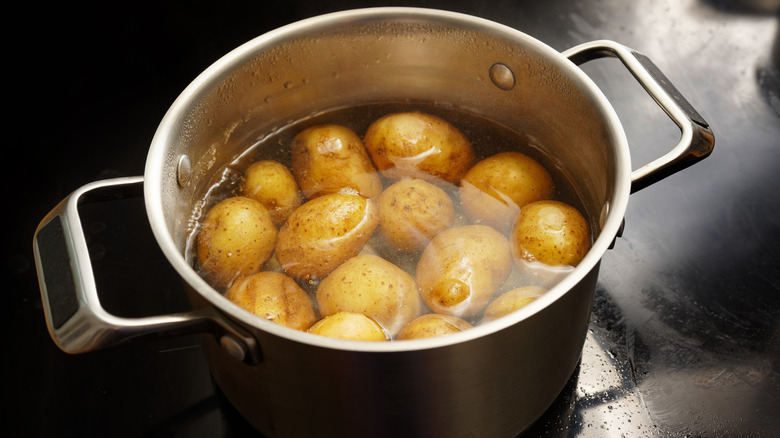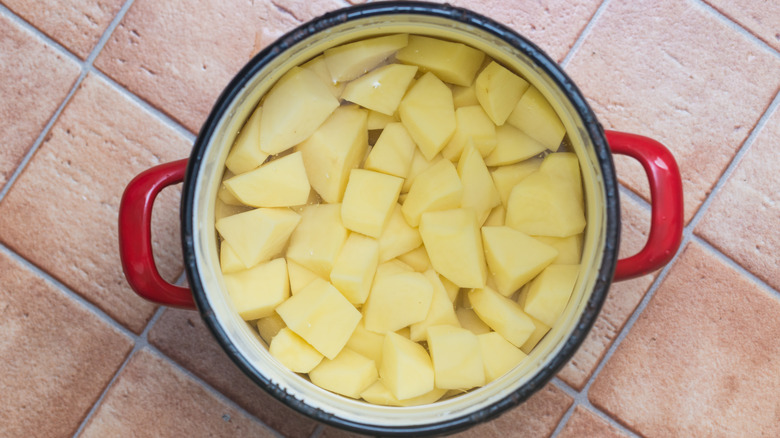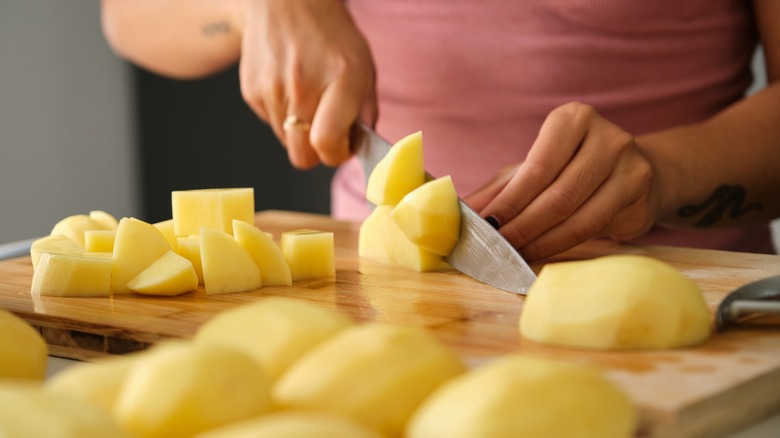Why You Should Always Start Potatoes In A Pot Of Cold Water
Whether you're planning on whipping up some creamy mashed potatoes or a simple herbed salad, boiling the potatoes first to soften them up is an essential part of these recipes. So, if you're feeling rushed, you might want to pick a different side dish, because boiling takes both time and patience.
While those basic recipes that call for potatoes might list boiling as the first step, there's one important thing you should always be doing first. Let your potatoes sit in cold water. This action might seem pointless to some chefs, but it actually comes with one huge benefit: It ensures your potatoes all cook evenly. Whether you prefer russets or reds, heat takes time to travel through food. For properly heated potatoes from skin to core, you need to let them start off in cold water so they gradually heat up at the same time, instead of the exterior meeting the hot water first and warming up way too fast.
Skipping this simple step could leave you with potatoes with a mushy surface and stiff, undercooked interior. For most potato recipes, that texture is not what you really want, so don't skip it. Additionally, this simple act also prevents you from encountering any gnarly splash burns from plopping potatoes in boiling water, so it's helpful in more ways than one.
Another benefit of starting potatoes off in cold water
While keeping potatoes in cold water is essential for potatoes of all varieties, it does an especially great thing for peeled potatoes: It stops the oxidation process. Oxidation is the process that turns potatoes brown, and it happens really fast once the skin is removed. A potato's skin protects its fragile internal enzymes from air exposure, which are very sensitive to discoloration. And when we say sensitive, we mean really sensitive. Often you'll see brown spots forming on your potatoes just a few minutes after peeling. So, to keep your potatoes pristine, keep them in a pot of water before they cook. (And for further protection, consider adding an one ingredient that can prevent mushy boiled potatoes into the pot too.)
Finally, cold water works wonders not just for peeled potatoes, but for your fried spuds, too. If you're planning on frying potatoes, giving them a bath in cold water for up to 30 minutes before cooking will remove excess starch from their interior. Excess starch gives potatoes a gummy texture, and also make potatoes cook unevenly, so this step makes for much crisper, golden-brown end products.
Other techniques to prevent unevenly cooked spuds
While starting your potatoes off in the same cold atmosphere prevents uneven cooking, there are a few other ways you can ensure perfectly boiled batches too. For starters, size uniformity is key. If you've got a medley of potatoes across the spectrum of big and small, you might want to cut them up all into similar sizes first. Otherwise, every potato you pick from the boiling water will be like picking a wild card: Is the interior of this one cooked or uncooked? Cutting the potatoes up ensures you know exactly how long to cook them for. Plus, slicing potatoes up small also cuts down on cooking times.
To check if your potatoes are really cooked evenly through and through, simply stick a knife straight through one of the cooked spuds. If you encounter any resistance, the pot isn't done. But, if the knife easily pierces through the soft flesh of the entire potato, they should all be ready to go. Now you can perfect the texture of your boiled potatoes, but if the flavor's still a problem, here's our key for a much more flavorful mash.


